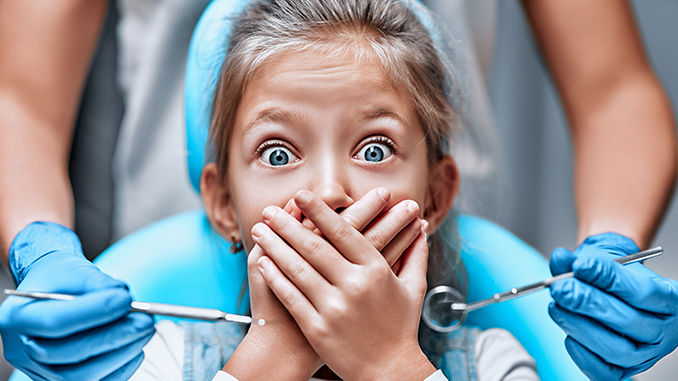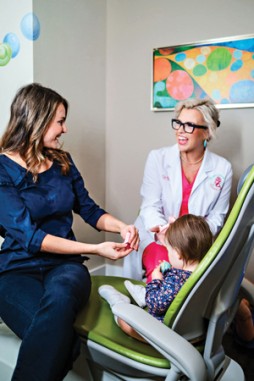
Published: January 25, 2023
By: Kimberly Blaker
Most often, children’s visits to the dentist are a positive experience for parents and kids alike. Despite this, between 9 and 15 percent of American adults fear dental visits, according to Cleveland Clinic. When parents are anxious about the dentist, that nervousness can instill fear and anxiety in their child, too.
Adults and kids may fear going to the dentist for several reasons. Cleveland Clinic explains that perhaps the adult or child had a negative dental experience or has heard horror stories that exaggerate their fears. The most common cause of anxiety is the fear of pain. Also, some kids and adults worry about the effectiveness or side effects of anesthesia or have a fear of needles.
A negative experience at the dentist as a child can result in continued anxiety over routine dental care even into adulthood. So, to ensure a positive, successful experience, know how to prepare yourself and your child for his or her first and subsequent dental visits. Doing so will pave the way to a lifelong devotion to regular and consistent dental care when your child becomes an adult.
Your child and the dentist – building a positive relationship early on
The earlier your child begins visiting the dentist, the better. The American Academy of Pediatric Dentistry recommends your child’s first visit by the age of one or within six months of when the first tooth erupts. At this stage, your child’s visit will be quick, simple, and pain-free. Providing your child early positive experiences will help your child develop trust in the dentist.
Be aware that depending on your child’s age and the dental office policies, many dentists will ask you to remain in the lobby during your child’s checkup. This is the typical recommendation for children over the age of 3. There’s a good reason for this. Separating a child from parents usually results in fuller cooperation from children. This can go a long way toward a more positive experience for your child. But it does differ from dentist to dentist.
At Angelica Rohner Pediatric Dentistry, they do it both ways. “Every child’s personality is different, Dr. Angelica Rohner says. “We have found that having one-on-one time with most children is helpful in them having a good experience. But we have also found that some parents are very helpful when their child has particular needs that require their assistance. Again, we take time to learn each child’s needs and discuss with the parents on the next appointment’s best approach.”

When your child is placed in the care of the dental staff, they’ll try to make your child’s first experience fun and informative. The dentist will explain and demonstrate routine procedures to your child and then perform those procedures. Your child quickly learns the dentist is someone to trust. Down the road, if your child needs non-routine dental work, the dentist will similarly work with your child to help alleviate fears.
Dr. Olga M. Sanchez-Hernandez D.M.D., M.S., M.S., of McCalla Orthodontics and Pediatric Dentistry, says every pediatric dental office, include hers, establishes procedures about parental presence during the dental visits, yet those procedures are not standardized and are influenced by many factors. She echoes Rohner’s opinion that every child is different. In fact, she says the age is often a deciding factor, as well.
“It is important for parents to feel comfortable with the office procedures of the particular dental office they choose to attend,” Sanchez-Hernandez says. “If they are concerned, they can always ask their pediatric dentist to explain their office policy and their reasons behind it.”
Avoid causing your child alarm and make the call in private so your child doesn’t pick up on your anxiety. Explain your specific concerns so the dentist can address and alleviate your worries.
Approaching scared or uncooperative children
For a variety of reasons, some children become fearful or uncooperative during a visit to the dentist. If your child arrives unprepared or senses your anxiety, your child may develop undue worry.
Previous experience could also cause stress. Kids who are ill or have a physical or mental disability, a behavioral disorder, or developmental delay may also be challenging to treat.
“Smaller kids havec an innate fear of several things. Some parents may unfortunately use the dentist and threats of ‘shots and needles’ as a way to deter the patient from poor oral hygiene or eating a sugary diet,” says Kendrea B. Jones, D.M.D., managing dentist at Vital Smiles. “Siblings and other kids can often share dental ‘horror stories’ for laughs or to invoke fear.”
Whatever the reason for fear or lack of cooperating, the way your dentist handles your child’s fears and behavior is vital to your child’s emotional well-being and ability to cope with future visits.
The American Academy of Pediatric Dentistry has developed guidelines for behavior management that dentists should follow. Your dentist should use the communication techniques learned in dental school, including positive reinforcement, distraction, voice control, non-verbal communication, and the tell-show-do approach.
Prevent an experience that heightens your child’s fears by being proactive. Contact your state’s board of dentistry when choosing a practitioner to make sure there have been no disciplinary actions. Also, inform your dentist of any medical, behavior or other conditions that might affect your child’s visit. Pediatric dentists have specialized training for dealing with situations that can arise with children. If you suspect your child may have difficulty with dental visits, seek a pediatric dentist.
Tips to get your child on the right track
Tell your child about the benefits of going to the dentist, such as to help keep their teeth strong and healthy and so they’ll have a beautiful smile.
Read to your child before their first visit to the dentist. Try one of the following:
- Why We Go to the Dentist by Rosalyn Clark
- The Berenstain Bears Visit the Dentist by Stan Berenstain and Jan Berenstain
- Celebrate! Going to the Dentist by Sophia Day
- Dentist Trip (Peppa Pig) by Scholastic
- Curious George Visits the Dentist by H.A. Rey
Share a DVD with your child, such as A Trip to the Dentist Through Pinatta’s View.
Explain to your child the necessary procedures he can expect. For example, the dentist will count your child’s teeth and look at them with a tiny mirror. Avoid frightening terminology.
As your child grows, if you have concern over a possible cavity, don’t give your child too much information. This can result in undue anxiety. Your dentist should have the experience and expertise to talk to your child about such procedures in a manner that alleviates any stress your child might experience.
If your child is anxious, don’t try to soothe your child by lying about a procedure or possible pain. Instead, try to alleviate fears that may be out of proportion to the situation.
